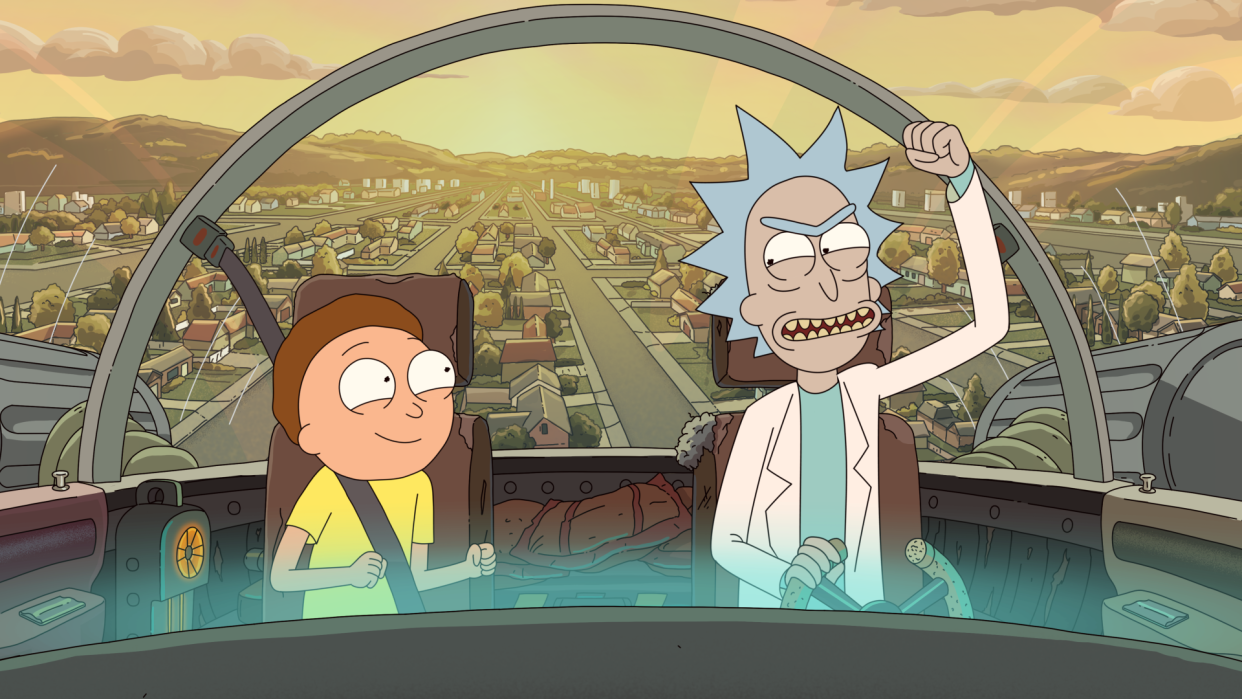Rick and Morty 's Seventh Season Was One of the Best Yet

- Oops!Something went wrong.Please try again later.
- Oops!Something went wrong.Please try again later.
Warner Bros. Discovery
When Rick and Morty began its seventh season earlier this year there was a question lingering over the beloved (sometimes arguably too beloved) animated sitcom: Would anything change?
Co-creator Justin Roiland had left following allegations of domestic violence, and would not be voicing the two title characters like he had in the past. No one would dispute the idea that Roiland's firing was necessary, but there was still a question as to how his departure would impact the show, even though he reportedly hadn't really been involved in its development beyond his acting for years. Was it time to just leave Rick and Morty behind?
Watching this season, which ends next Sunday, the answer has been decidedly: No. With two new performers voicing Rick (Ian Cardoni) and Morty (Harry Belden), this last seven-episode run has been one of the series’ best—weird, creative, gross and emotional. If you've tuned out—whether because of Roiland, the overly intense fandom, or just general, understandable malaise—it might be time to get back on board.
Yes, at first the new voices took some getting used to. There was a strange uncanny valley quality to hearing a slightly altered version of characters whose dialectical flourishes are so recognizable. But the writers gave Cardoni and Belden great material and they rose to match it, ultimately finding a way to make these reliable archetypes more unique and at times emotional.
This was never clearer than in the fifth episode of the season, "Unmortricken," which closed out one of the show’s longer-running subplots: Rick's search for his shadow self, Rick Prime, who was responsible for killing his wife. Rick and Morty are thrust into partnership with another one of their respective multiversal duplicates, the conniving Evil Morty, after they’re all captured by the vicious Rick Prime. It's an exceedingly violent episode, in which Rick and his two Mortys are forced to kill other versions of Rick to escape, as well as battle a giant robot version of Rick's wife's head, who taunts him in her voice.
But nothing is more shocking than the show’s final moments in which Rick beats Rick Prime to a pulp, ultimately killing him with his bare hands. "Admit it, you would have been me," Rick Prime tells Rick through the blood in his mouth. "I just walked into your garage before you walked into mind. But eventually you did. You live in my house."
I'll acknowledge that I've found it hard to sometimes keep track of the various parallel universe versions of these characters, but the search for Rick Prime has always represented the underlying tragedy of a character who can easily be reduced to drunken catchphrases. In "Unmortricken," Rick finally confronts his trauma in a way that’s both true to form for Rick and Morty (funny, disgusting) but also deeply tragic, with Cardoni’s performance capturing the emptiness of the search for vengeance.
After he emerges, covered in blood, Evil Morty asks: "How does it feel? Better? No? Exactly the same? Yeah, it always does." Rick tells him to "Fuck off." As Rick returns home, Mazzy Star's mournful "Look on Down from the Bridge" plays-- a callback to a Season 1 episode, in which the same song accompanied a montage of Morty sleepwalking through life after another traumatizing adventure. This time it’s Rick staring silently into the distance as the Smiths continue on with their lives. It's bizarrely heartbreaking.
The new season of Rick and Morty hasn't all been that deep. "Unmortricken" is followed by "Rickfending your Mort," a dose of silliness in the form of a spin on the sitcom clip show, in which the clips are provided by a race of geode-like aliens called Observers. And prior to that, there was the deeply revolting "That's Amorte," in which Morty learns that Rick's special spaghetti is made from the innards of humanoid beings from a planet where people’s organs turn into spaghetti when they commit suicide. The story becomes a sharp commentary on capitalism and guilt; it’s also extremely ridiculous, and may make you want to throw up.
As with any long-running show, there have also been a few subpar episodes. (The return of Ice-T as Water-T from a planet of letters was silly but underwhelming.) Despite that, it's been a smart, engaging season, a pleasant good riddance to Roiland's toxicity that proves this hit still has juice.
Originally Appeared on GQ

